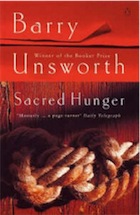This book was published in 1992 and won the Booker Prize. It is about greed, raw capitalism and the relentless pursuit of profit, the sacred hunger, “which justifies everything and sanctifies all purposes” in the triangular slave trade. The story revolves around a conflict between Thurso, the captain of a slave ship and Paris the ship’s doctor. Life aboard the slave ship is contrasted with the life of the wealthy owners back in Liverpool.
The nature and mechanics of the barbaric treatment of “the human cargo” is described in detail. So are the press gangs, floggings, starvation rations and disease which were the reality of life for the eighteenth century seaman. Unsworth avoids stereotyping as each individual crew member and their relationship to authority is brought to life. For Thurso the welfare of the slaves competes with the welfare of the crew as the pursuit of profit places a monetary value on the human cargo. Crew and slaves are eventually brought together on equal terms as a result of a mutiny and live and strive to work together with equality and freedom in a renegade colony.
At first the narrative focuses mainly on the characters from the class that have caused all this suffering. However as the book progresses it becomes more interesting as the voices of the slaves and the sailors grow stronger. Differences emerge as life in the colony confronts the dangers from inside and outside.
Sacred Hunger may be set in the days of slavery but it’s designed to tell us about our own recent history. As Unsworth himself said in a 1992 interview about the miner’s strike, “It was impossible to live in the Eighties without being affected by the sanctification of greed. My image of the slave ship was based on the desire to find the perfect symbol for that entrepreneurial spirit. The arguments used to justify it are the same used now to justify the closure of these pits and throwing out of work of all these miners”.





